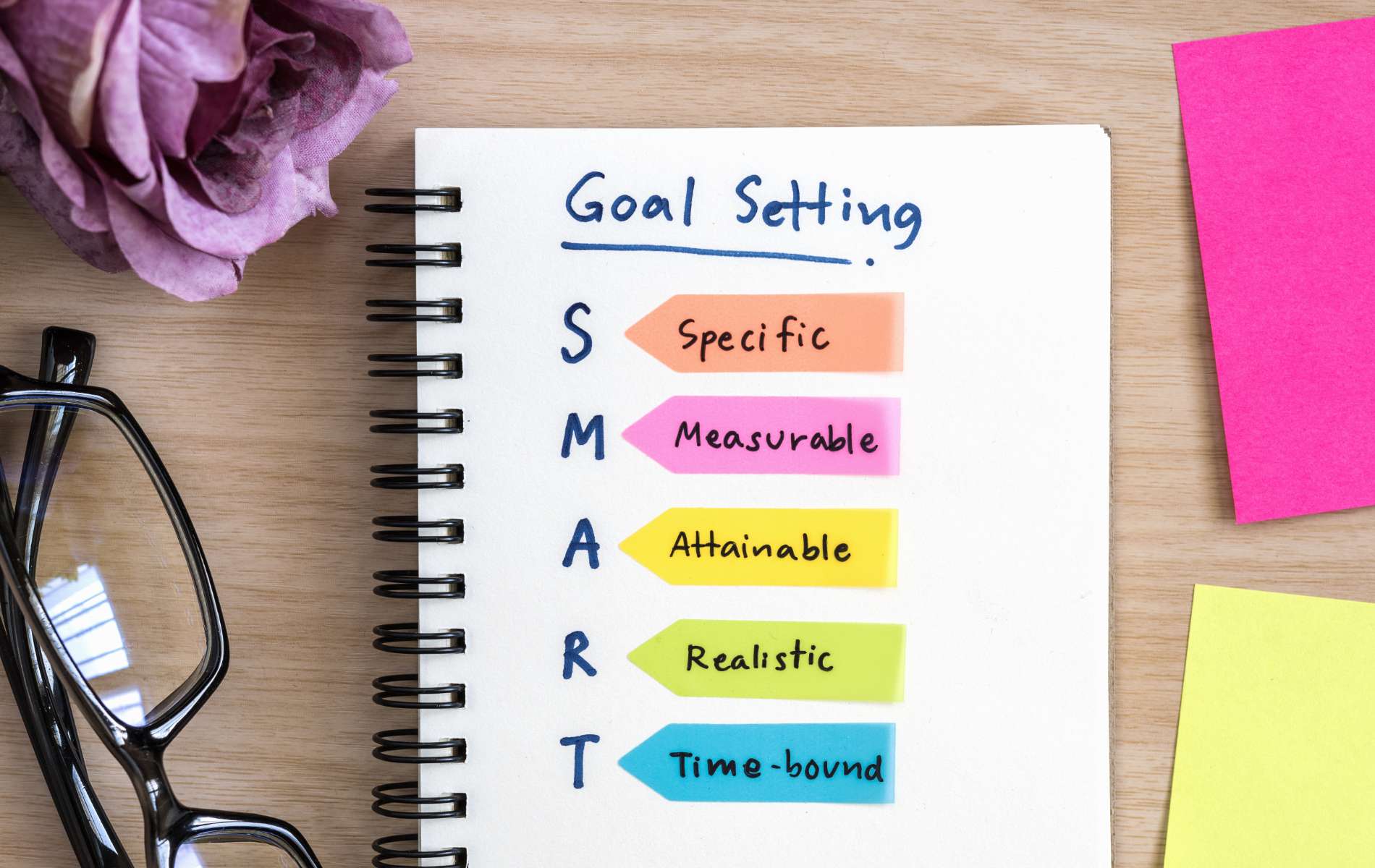Anything you wish to achieve in life, whether in school or your career, is a goal that you can attain if you put in the work. But working hard is not always the answer, especially when your Goal is not clear or you haven’t set steps to reach your target. Without a roadmap, you may never complete your Masters’ or get that promotion.
SMART Goal is a framework that was designed to solve this problem by allowing you to map out every step toward achieving your target. This article explains what it means and how you can use it to achieve all your goals, big and small.
What Are SMART Goals?
SMART is an acronym and goal-setting framework widely attributed to the Management by Objective concept created by Peter Drucker. Since its first recorded use by George T. Doran, it has been translated to mean several things to different people. The most used definition breaks down SMART as follows; it states that a goal must be:
- Specific
- Measurable
- Achievable
- Relevant
- Time-bound
As mentioned, there are multiple interpretations of SMART goals, some of which include:
- Simple/Significant/Sensible
- Meaningful/motivating
- Agreed/Attainable
- Reasonable/Resourced/Realistic/Results-based
- Time-based/Time-sensitive/Time-limited/Timely
Importance of SMART Goals
The SMART goal framework allows you to set a target, define the resources, skills, and support needed to achieve it, and helps you track your progress. Using it increases your chances of achieving your Goal significantly and can mean the difference between failure and success.
With a SMART goal, you know exactly what you want to achieve, what it will entail, how long it will take, and how fulfilling it will impact other areas of your life. Even better, the plan is easy to implement and can apply to any situation without training.
How to Use SMART
From the definition, you know what each letter in SMART stands for. Here is a breakdown of how you can apply this information to your goal-setting process.
1. Specific
A specific goal can be attained because you can picture it and know exactly what it entails. To make your Goal specific, you should answer the following questions:
- What do you wish to accomplish?
- Why is accomplishing it important to you?
- Whose support will you need to accomplish it?
- What skills or resources will you need?
2. Measurable
When a goal is measurable, you can track your milestones and overall progress. Meeting these milestones will keep you motivated as you see yourself draw closer to your target. For a goal to be measurable, it must include numbers; how many steps are there to your Goal?
3. Achievable
So you have a specific and measurable goal, but is it something you can achieve? Is it within your abilities? Is it realistic? While your Goal might stretch your resources and skills a little, it should be possible to do. You can determine this by defining any constraints that could impede your progress and how you will deal with them.
Tip: Always personalize your goals, so they depend on your efforts and not on the decisions or actions of others.
4. Relevant
Getting a promotion is an excellent goal for someone who already has a job but can be irrelevant to someone who hasn’t graduated college yet. Your Goal should be relevant to your life at the moment and to your future plans. Generally, a relevant goal is one:
- That matches your other efforts
- That seems worthwhile
- Is applicable at this time and in your current environment.
5. Time-Bound
Finally, every Goal should have a timeline, so you don’t take too long to achieve it. A time-bound goal allows you to focus your energy and increase your efforts, so your Goal is not relegated to the backburner while everyday life swarms your days. Making your goal time-bound involves answering the questions when will I achieve this Goal?
Smart Goal Template
Initial Goal: {Write a general goal from what you have in mind}.
- Specific (S): {Indicate what you wish to accomplish, when and why you want to do it, and who will be involved}.
- Measurable (M): {Explain how you will track your progress and know if you have met your Goal}.
- Achievable (A): {Mention the skills you will need to achieve your Goal. Do you have these skills and, if not, how can you obtain them?}
- Relevant (R): {Define how this Goal aligns with your general objectives and long-term plans. Is this Goal relevant at the moment?}.
- Time-bound (T): {Assign a realistic deadline for achieving your Goal}.
Smart Goal: {From what you have written, come up with a goal statement that is more detailed than your smart Goal}.
Broad Goal Example: Want to Start a New Business
Initial Goal: To open a new business.
- Specific: I will offer freelance bookkeeping services.
- Measurable: I will be ready to work with two small-business clients within three weeks and work with at least three clients every month.
- Attainable: I will set up an online account and brand myself as a freelance bookkeeper. Next, I will sample two projects to add to my skill profile and promote my new business through connections from my last job at ABC Accounting.
- Relevant: Offering bookkeeping services will allow me to earn money from my knowledge while practicing my skills as I prepare for Accounting school.
- Time-bound: My bookkeeping business will be established and functional in three weeks, and I will have regular clients by the end of 6 weeks.
SMART Goal: Within 6 weeks, I will set up a bookkeeping business that will allow me to earn from my knowledge and improve my accounting skills. The business will be up and running in 3 weeks, and I will be accepting clients by the 6th week. I will promote my business through connections I made at my last accounting job at ABC Accounting.
Broad Goal Example: Want to Grow the Business
Initial Goal: I will expand my business.
- Specific: I will start selling my handcrafted mats in two more cities in New Jersey; Huntington Beach and Jersey City.
- Measurable: I will measure my success by how many handcrafted mats I sell in Jersey City and Huntington Beach while maintaining my current operations in Bayonne.
- Attainable: Two store owner friends based in these cities have agreed to sell my mats in their stores. I will ask my current clientele for referrals and promote the new locations through my social media.
- Relevant: Expanding to other cities will help me increase my returns and reach a wider market. It will also help me save the time and money I use to deliver mats to these cities in my van.
- Time-based: I will make 20 starter mats for each store within 8 weeks.
SMART Goal: In 8 weeks, I will expand my operations to include two more stores that sell my handcrafted mats in Jersey City and Huntington Beach. I will rely on two friends who have agreed to display my mats. This will allow me to reduce my weekly trips and increase my market reach and income.
Broad Goal Example: I Want to Become the Best in My Field
Initial Goal: I will become an expert in my field.
- Specific: I will become a renowned expert in the field of Astrophysics.
- Measurable: I will achieve my Goal when I get a tenured job in a major research university like Cal. Tech University and write for Scientific American at least once a month.
- Attainable: I will achieve my Goal by completing my Ph.D. in Astronomy and Astrophysics and applying for a grant for new research.
- Relevant: Establishing myself as an expert in the field will complete my 15-year career plan and will allow me to contribute to the field of Astrophysics on a larger scale.
- Time-based: I will achieve my Goal in two years.
Smart Goal: In two years, I will apply for tenure at Cal Tech, write for Scientific American, and establish myself as an expert in the field of Astrophysics. I will achieve this by completing my Ph.D. in Astronomy and Astrophysics. This will allow me to complete my 15-year career plan and contribute to the field of Astrophysics on a larger scale.
SMART Goals FAQs
What are the 5 smart goals?
SMART stands for the 5 key elements of a goal. By this definition, a goal must be specific, measurable, achievable, relevant, and time-based.
How do you write a smart goal?
Step 1: Write a broad initial goal.
Step 2: Supply more details to make the Goal more specific. Answer the questions what, who, when, why, and how.
Step 3: Define how you will measure your progress and success.
Step 4: Explain how you plan to achieve the Goal and what you will need to do it.
Step 5: Indicate how the Goal is relevant to your overall plans.
Step 6: Assign a timeline for your Goal.
Step 7: From the information in steps 2 through 6, draft a statement that best describes your Goal.
What is realistic in smart Goal?
Realistic (or relevant) in SMART goals, refers to the attainability of a goal and its relevance to your life at the moment. It answers the question: is your Goal far-fetched or unnecessary?
SMART is a long-used and reputable tool that can help you effectively plan and achieve your goals. It ensures your goals are clear, realistic, meaningful, and relevant to your long-term plans. Currently, there are several interpretations of the meaning of the acronym, but the most common one dictates that your Goal must be Specific, Measurable, Achievable, Relevant, and Time-bound.
Looking For Document Management System?
Call Pursho @ 0731-6725516
Check PURSHO WRYTES Automatic Content Generator
https://wrytes.purshology.com/home
Telegram Group One Must Follow :
For Startups: https://t.me/daily_business_reads




